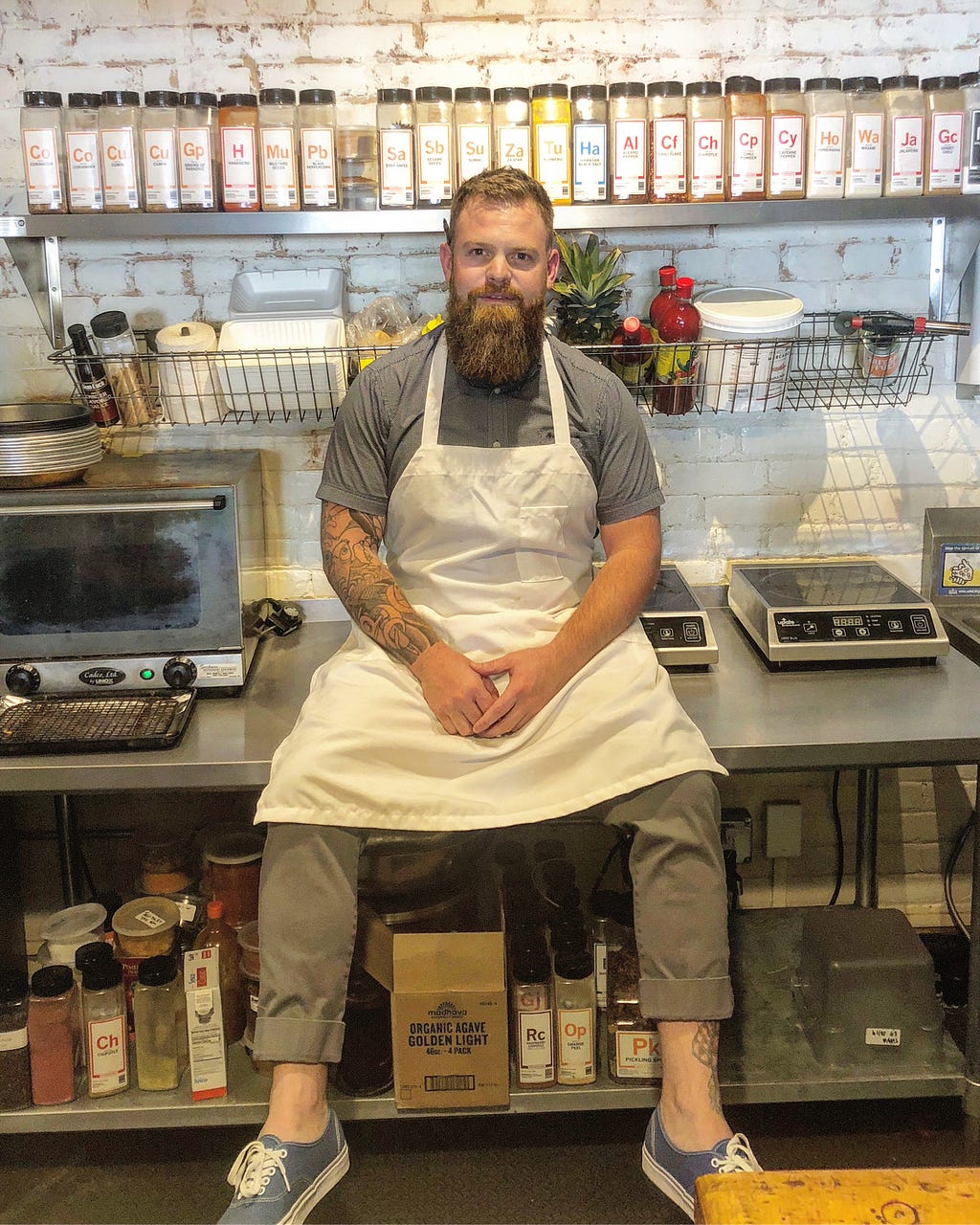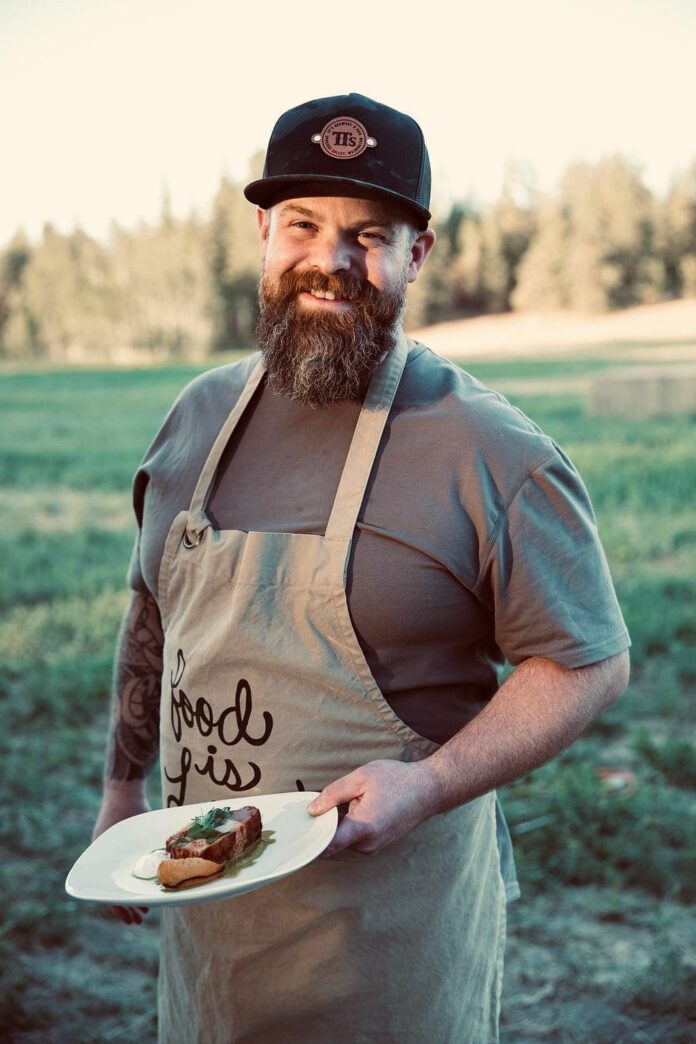An Interview With Martita Mestey
Never Give Up and “Can’t” Is the Worst Four Letter Word
As a part of our series about the lessons from influential ‘TasteMakers,’ I had the distinct pleasure of interviewing Chef Chad White.
With a culinary career spanning over two decades, Chef Chad White’s journey began during his service in the United States Navy, which began on 9/11. His innate passion for culinary creativity led him to become the driving force behind some of San Diego’s most esteemed kitchens and eventually back to his native Spokane, where he introduced the renowned ceviche bar Zona Blanca, to the local dining scene. Chef Chad was featured on Bravo’s Top Chef Season 13 and his many accolades include: recognition as Inlander’s Best Chef for six consecutive years, two James Beard nominations, Innovator of the Year award from the Washington Restaurant Association in 2018, emerging philanthropist recognition from United Way in 2022, was named one of Spokane Coeur d’Alene Living Magazine’s 40 under 40 in 2022.
Thank you so much for doing this with us! Our readers would love to ‘get to know’ you a bit. Can you share with our readers a story about what inspired you to become a restauranteur or chef?
I don’t have a, “I spent all my days as a child cooking with my German grandmother,” story to tell. Rather, I joined the United States Navy as a result of feeling compelled to serve my country after the attacks on September 11, 2001. After testing, the rate ‘job title’ I qualified for was a ‘Mess Specialist’. In short, a navy cook, now called a ‘culinary specialist,’ is more relevant when crossing decks from the military sector to the civilian world. I learned to love food more after traveling the world; before, I was a really picky eater. Exploring foreign lands on deployments coupled with watching cooking shows like Iron Chef, Top Chef and many others, I started to really love cooking and discovering new foods. As a kid, I was very artistic and enjoyed making others smile. As a young adult, I traded my paintbrushes and pencils for spoons and knives. I started to see plates as a canvas for the food I now, as a chef/restaurateur, artistically plate and serve our guests.
Do you have a specific type of food that you focus on? What was it that first drew you to cooking that type of food? Can you share a story about that with us?
I focus mostly on coastal Baja and Mexican flavors and techniques. The flavors in Latin America have ties to so many other nations, making it exciting (not to mention a ton of documented history on the cuisine and its evolution from the pre-Hispanic era to the modern Mexican flavors of today). My connection to this type of cuisine has various layers. My grandfather lived in San Felipe on the coast of the Sea of Cortez in Baja Norte. I visited a lot as a young boy. Later, in my early 20s, I met my former wife from Coyuca Benites near Acapulco, Guererro. She and her family immersed me in their culture. We often shared the stove and recipes while her father was a cook of mine. In 2012, I temporarily moved to Tijuana and opened the popular restaurant La Justina, spending a great deal of time cooking and learning from some of Baja and Mexico’s best chefs.
Can you tell us a story about the hard times that you faced when you first started your journey? How did you overcome this obstacle?
Due to my achievements in the kitchen aboard the USS Ronald Regan CVN-76, I participated in an internship program with the Hotel Del Coronado for Navy Cooks. During this internship, I was offered a position as Chef de Partie, a low-level management position.I didn’t receive the opportunity solely based on my culinary skills but rather because of my sheer will, determination, discipline and leadership skills. In fact, I was very green. In my internship, I learned from the hotel cooks and chefs who treated me with great kindness and appreciation for their willingness to do the jobs they did not like doing.
When I returned after my last day in the Navy months later, as some of the cooks’ direct supervisors, I wasn’t met with the enthusiasm or kindness I expected. I really struggled to get the teams to start the tasks given, let alone finish the tasks. I found myself in an uphill battle that I wasn’t winning and I didn’t know how to navigate it. I felt like I was set up for failure. As a manager, I was not a union member, but the cooks were. This means when I took it upon myself to complete the tasks I had given, I got in trouble with the union for doing their job and potentially taking hours from them. This was especially hard because I was held accountable for the performance and efficiency of the team.
Coming from the military, I was accustomed to a certain style of leadership. If questioned by a subordinate, “Because I said so,” or, “Because I outrank you,” would have been appropriate responses. Right, wrong, or indifferent, that’s just how it was in my experience. But, I quickly I had to learn that the team wasn’t going to respect the ‘title’ I was given from the executive chef. I had to earn the respect of the team, and barking orders was getting me nowhere quickly. Instead, I showed a willingness to collaborate on the tasks. I made sure to set clear expectations and invite them to suggest solutions by fostering open communication. Additionally, being fair, leading by example and doing what I said I would do ultimately put me in a position where I was able to lead my team effectively and become successful.
In your experience, what is the key to creating a dish that customers are crazy about?
Make something that you’re crazy about. When you truly enjoy something you make, most likely, your guests will feel the same.
Personally, what is the ‘perfect meal for you’?
Something nostalgic! Something that can transport you to a great memory. This could be as simple as a lunchtime grilled cheese prepared by grandma or a cheap cheeseburger from the burger joint frequented in your 20s. Often, meal enjoyment is based on who it is shared with. For me, the perfect meal is one with all my children taking part in its preparation and the moments after at the table, sharing stories and ambitions.
Where does your inspiration for creating come from? Is there something that you turn to for a daily creativity boost?
As a kid, I couldn’t sit still, I always had a lot of energy and enthusiasm. Many could claim not much has changed. I’m inspired by the things I see, smell, touch and hear etc. The thought of trying something new, improving something, or maybe fixing something broken excites me. I enjoy problem-solving.
Are you working on any new or exciting projects now? What impact do you think this will have?
The older I get, I find myself trying to simplify my experiences and focus more on what makes me happy or gives me peace. I find myself more in nature and seeing the value of time well spent. I’m currently working on a new immersive outdoor dining experience that will bring my guests into nature. It will involve old world cooking techniques focusing on the four elements: earth, water, air and fire.
What advice would you give to other chefs or restaurateurs to thrive and avoid burnout?
Take the time to take care of yourself and your mind. After a challenging service, many young cooks and chefs tend to find their enjoyment, or relieve stress, on a bar stool until late into the evening rather than getting the rest they need. Instead of going to the bar, go on a walk, read a book or dine at your competitor’s restaurant. Invest in what will give back to you longer term. I love a good glass of tequila but if I stayed out each night, I couldn’t do what I do effectively nor would I retain the resources I need to take the next risk.

What are your “5 Things I Wish Someone Told Me When I First Started as a Chef” and why?
The Peaks and Valleys
When you put your heart and soul into something, it’s difficult not to take things personally. There have been great days, weeks, months and years, but a tumble to the valley floor can be just a minor misstep away. I’ve also had to remember not everyone is going to like my food!
How Lonely It Can Be at the Top
Recently I heard a quote read by Chris Williamson: “Fame and success doesn’t change you. When you’re on your way up, everyone roots for you because you remind them of their dreams. When you’re at the top, many tear you down because you remind them that they gave up on them.” I’ve felt this first hand, in and out of the hospitality industry.
Balance and Greatness Don’t Go Together!
Balance has not been the only barrier but by far the biggest one that has stood in my way of reaching the goals I’ve set. As I matured, I found that dedicating more time to my professional goals — oftentimes by sacrificing personal activities like going out with friends or a day at the lake — allowed my career and success to flourish.
Never Give Up and “Can’t” Is the Worst Four Letter Word
Saying, “I can’t,” is a lie and an excuse at best. Instead, it’s “I won’t”.
To Practice Restraint, Less Is More!
I would dream up and plate the wildest creations as a young chef. I remember an eight-course chef’s table tasting menu for eight, called Caja Ocho. I curated at Comun, a restaurant I owned in San Diego. I recall making a study of onions. As a kid, I hated onions, so this was essentially me maturing on a dish. It consisted of a Walla Walla sweet onion sous-vide, whole in an onion and bone marrow consome for 24 hours, onion aspic, onion powder, onion foam, onion skin chicharron, onion ash and an onion demi-glace garnished with onion flowers. The dinners hardly made any positive financial impact due to the amount of time it took to prepare and the many techniques I highlighted on almost every dish. I find myself still dreaming and creating bold and unique flavors, but with far more restraint. Now I hyper-focus on only a few ingredients simply executed at a very high level and then refine.
What’s the one dish people have to try if they visit your establishment?
Scallop crudo with a banana-tepache vinegar, toasted coconut and urfa biber sea salt.
You are a person of enormous influence. If you could inspire a movement that would bring the most amount of good to the most amount of people, what would that be? You never know what your idea can trigger.
Always lead by example. Your future is affected by those who follow your example.
Thank you so much, Chef Chad White, for these insights. This was very inspirational!
Chef Chad White of Zona Blanca: 5 Things I Wish Someone Told Me Before I Became a Chef was originally published in Authority Magazine on Medium, where people are continuing the conversation by highlighting and responding to this story.


